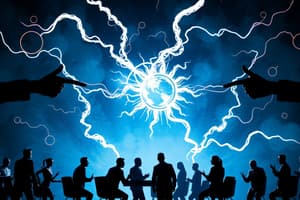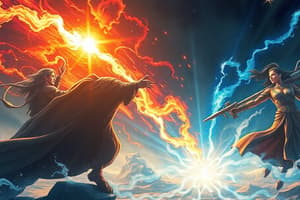Podcast
Questions and Answers
What type of power focuses on personal empowerment and self-determined power?
What type of power focuses on personal empowerment and self-determined power?
- Decision-Making Power
- Power-To
- Power-Within (correct)
- Power-With
Which of the following represents formal authority and hierarchical position in decision-making?
Which of the following represents formal authority and hierarchical position in decision-making?
- Agenda Setting
- Decision-Making Power (correct)
- Institutional Power
- Social Circuit
What does the 'Social Circuit' in the Circuits of Power refer to?
What does the 'Social Circuit' in the Circuits of Power refer to?
- Organizational agreements and systems that support power usage (correct)
- Disciplinary methods for controlling individuals
- Individual self-regulation based on ethics
- Formal authority of influential leaders
Which wave of power involves the control of behavior through ethical self-regulation?
Which wave of power involves the control of behavior through ethical self-regulation?
What is the primary focus of disciplinary power as per Foucault's writing?
What is the primary focus of disciplinary power as per Foucault's writing?
How can resistance be interpreted in the context of organizational change?
How can resistance be interpreted in the context of organizational change?
What type of power is characterized by established norms and values within an organization?
What type of power is characterized by established norms and values within an organization?
Which aspect of power includes the influence over prioritizing issues within an organization?
Which aspect of power includes the influence over prioritizing issues within an organization?
What defines power as a possessed resource?
What defines power as a possessed resource?
Which type of power involves using rewards to influence behavior?
Which type of power involves using rewards to influence behavior?
What is the primary focus of relational or cultural power?
What is the primary focus of relational or cultural power?
Which term best describes the ability to influence others through fear of punishment?
Which term best describes the ability to influence others through fear of punishment?
In the context of power dynamics, what does the term 'power-over' refer to?
In the context of power dynamics, what does the term 'power-over' refer to?
What is a characteristic of expert power?
What is a characteristic of expert power?
Which base of power involves having access to valuable information?
Which base of power involves having access to valuable information?
According to the seven bases of power, which base allows for influence through charismatic appeal?
According to the seven bases of power, which base allows for influence through charismatic appeal?
Flashcards are hidden until you start studying
Study Notes
Definition and Types of Power
- Power is the ability to influence, persuade, and control others through various means such as consensus building and creativity regulation.
- Traditional power is seen as hierarchical and possessive, often associated with authority figures like bosses.
- Relational or cultural power is situational, dependent on cultural norms, and varies across different contexts.
Power Dynamics
- Power can be actively wielded by those in control or passively received by others based on responses.
- Observable in conflicts and everyday social interactions, such as gossip or rumors.
Power in Concepts and Work Roles
- Relevant in organizational change models, such as Lewin’s 3-step model and Kotter’s 8-step process, where alliances and networks are critical.
Traditional Views of Power
- Authority and Hierarchy: Legitimate power derived from formal positions or seniority.
- Influence and Persuasion: The capability to affect others’ behaviors or convince them to adopt specific ideas.
Coercion, Remuneration, and Normative Power
- Coercive Power: Utilizing threats or punishment to enforce compliance.
- Remunerative Power: Leveraging rewards or incentives to influence behavior.
- Normative Power: Guiding behavior through established work or cultural norms.
The Seven Bases of Power (French and Raven, 1959)
- Reward Power: Authority over providing rewards.
- Coercive Power: Ability to impose punishment.
- Legitimate Power: Authority linked to a formal role.
- Expert Power: Influence derived from specialized knowledge.
- Referent Power: Power based on charisma or likability.
- Informational Power: Control over valuable information resources.
- Ecological Power: Ability to manage environmental or resource-related aspects.
Power Dynamics Models
- Power-Over: Exercising control over others through coercion.
- Power-To: Enabling others to achieve their potential.
- Power-With: Collaborative power through teamwork.
- Power-Within: Personal empowerment stemming from self-determination.
The Three Faces of Power (Lukes, 2005)
- Decision-Making Power: Authority associated with formal hierarchies.
- Agenda Setting Power: Control over issue prioritization within groups.
- Institutional Power: Norms and values that shape organizational behaviors.
Circuits of Power
- Episodic Circuit: Actions by leaders and key influencers.
- Social Circuit: Organizational agreements that facilitate power dynamics.
- Systemic Circuit: Resources and structures that allow power to function.
Four Waves of Power in Foucault’s Writing
- Wave 1: Disciplinary Power focuses on control through discipline and surveillance.
- Wave 2: Knowledge and Truth highlights how discourse influences behavior and perceptions.
- Wave 3: Governmentality examines distant control through metrics and market efficiency.
- Wave 4: Ethical Self-Regulation involves self-regulating behavior based on ethical standards.
Resistance
- Resistance is a reaction to change, driven by a desire for stability, stress avoidance, or identity preservation.
- Often seen as a psychological response stemming from fear and uncertainty regarding leadership.
- Resistance can provide essential feedback regarding leadership effectiveness and communication during change initiatives.
Studying That Suits You
Use AI to generate personalized quizzes and flashcards to suit your learning preferences.




